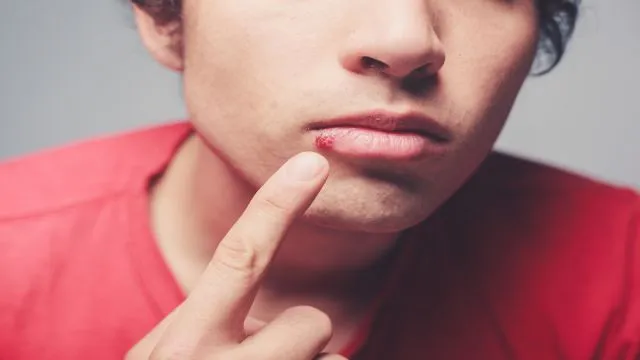
- Share on Facebook70
- Share on Pinterest
- Share on Twitter
Fever blisters, also known as cold sores, are painful blisters on the lip and around the mouth that form when you are exposed to the herpes simplex virus type 1 (HSV -1). Cold sores begin as red bumps around the mouth area and soon develop into pus-filled blisters that eventually scab over. HSV-1 can only be contracted through direct contact with an affected individual. This could be anything from kissing to sharing a drink or a razor with someone carrying the virus.
Keep in mind that this virus is incredibly contagious until the blister scabs over. Be aware of direct or indirect contact with unaffected people and try to limit their exposure. Once you are infected, it is impossible to eradicate the virus from your system entirely, but it will remain dormant unless aggravated by stimuli such as upper respiratory infections, sunlight, stress, or fever.
Because fever blisters are evidence of viral infection, they are usually more prevalent when your immune system is weakened or compromised. But there are also ways to help keep the virus dormant, including living a healthy lifestyle, clean-eating, and actively working to boost your immune system. Though these blisters can be irritating and often painful, if you have contracted HSV -1 and are subject to frequent outbreaks, don’t despair. You can prevent and treat this uncomfortable condition naturally.
Catch it early
One of the best ways to treat a fever blister is to prevent it from ever forming in the first place. The early symptoms of a cold sore include a strange tingling, burning, or itching sensation around the mouth and lips which usually precedes the formation of a blister by about 24 hours. Once you begin to notice these signs, you should begin treating the affected area immediately. Elderberry, calendula, and garlic oil all serve as antiviral agents that can help stop blister formation in its tracks.
Ice/cool compress
If you have no other treatment options on hand and are faced with a painful breakout, ice may be helpful in numbing the lips and temporarily reducing pain. Simply rub an ice cube around your lips, or apply an ice pack or cold compress to limit swelling and inflammation. Keep ice on blisters for about 20 minutes at a time.
Zinc oxide cream
Zinc is an important element of skin health and is necessary for a number of chemical reactions in the body that support fresh skin growth and protect from viral infections. Various studies have shown that when a topical zinc ointment was applied to a developing blister early, it reduced the length of the outbreak by five days. Many people are also prone to natural zinc deficiency and are more susceptible to contracting oral herpes. To boost your zinc levels naturally, try incorporating foods such as yogurt, chicken, turkey, salmon, and cashews into your diet, or taking a natural zinc supplement.
Lemon balm
Using a lip balm made with lemon balm essential oil or applying a compress made with lemon balm to your lips may help decrease redness and swelling, which can be helpful if you are trying to mask the unsightly appearance of fever blisters. There is no evidence, however, to support use to lemon balm as a long-term treatment for cold sores as it does nothing to help with scabbing or pain.
Aloe vera
Aloe vera is one of the most well-known plants for its healing and medicinal properties. It soothes irritated skin and can help encourage new skin growth, because of its potent vitamins, enzymes, and minerals.
Baking soda
This remedy is a great option when you have nothing else available. Place a little baking soda in a small dish and add water or lemon juice to make a paste. Apply to the area on and around your lips. Leave on for 10 minutes, making sure not to lick your lips, and then rinse well. Repeat this process daily until symptoms begin to fade.
Prevention
As with most things, prevention is often the best solution. If you have been exposed to the herpes virus and have experienced cases of fever blisters, it is important to cultivate your lifestyle to avoid frequent breakouts.
Limit stress
If you have a very stressful, tight schedule, you may be more susceptible to developing symptoms of the dormant HCV -1 virus. Take time out of your hectic day to meditate, focus on your breathing, or simply unwind in the evenings with a glass of tea before bed. Exercise can also help to productively direct your stress and give you a method of release.
Sunscreen
Using a zinc-based, natural sunscreen can help prevent a resurgence of the herpes virus. Research has shown that avoiding exposure to harmful UV rays during the brightest parts of the day, and regularly wearing sunscreen may significantly affect the frequency of blister formation. Use a 100% organic sunscreen or SPF lip balm to protect skin.
-The Alternative Daily
- Share on Facebook70
- Share on Pinterest
- Share on Twitter

